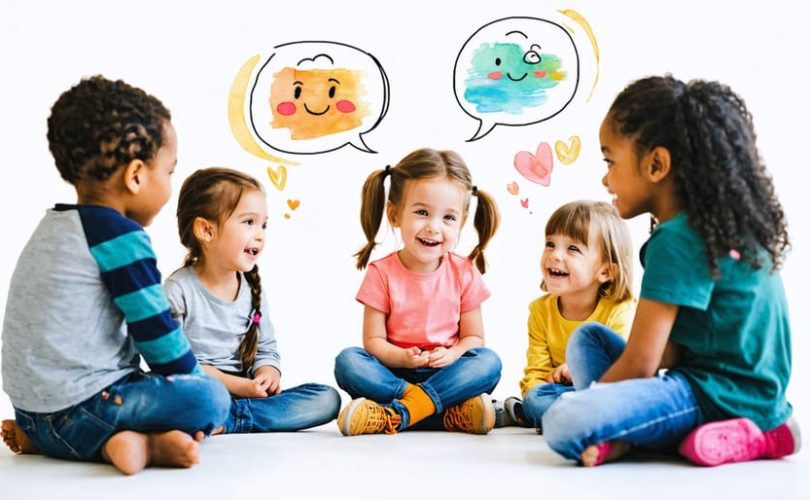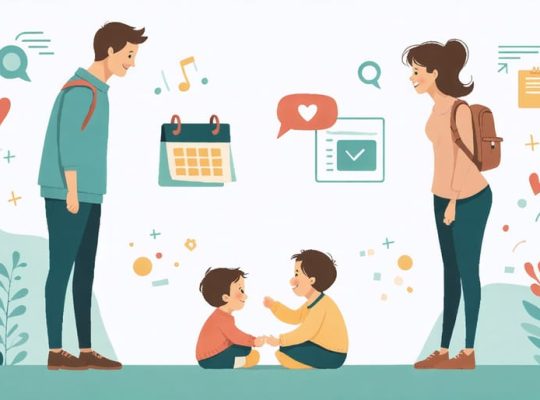Nurture empathy by encouraging your child to recognize and discuss others’ feelings during everyday interactions and while reading stories together. Model active listening, taking turns in conversations, and using “I feel” statements to help your 7-year-old develop effective communication skills. Foster cooperation through group activities and games that require teamwork, sharing, and following rules, such as board games or team sports. Teach conflict resolution strategies, including deep breathing, using calm words to express feelings, and brainstorming win-win solutions, to help your child navigate disagreements with peers. By addressing these crucial social skills early on, you can help your child build a strong foundation for healthy relationships and emotional well-being, reducing the risk of childhood trauma and its long-lasting effects.
Empathy and Emotional Intelligence
Recognizing and Understanding Emotions
Helping 7-year-olds recognize and understand their emotions is crucial for their social development. Encourage children to name their feelings, such as happiness, sadness, anger, or fear, and validate their experiences. Use everyday situations to discuss emotions and how they affect behavior. Reading books about feelings, playing emotion-based games, and using visual aids like emotion charts can help children identify and express their emotions effectively.
It’s equally important to teach children to recognize and empathize with others’ emotions. Discuss facial expressions, body language, and tone of voice as cues to understanding how someone else might feel. Encourage children to put themselves in others’ shoes and consider their perspectives. Family dynamics play a significant role in shaping a child’s emotional understanding, so model empathy and emotional intelligence in your own interactions.
Practicing Empathy in Everyday Situations
Practicing empathy in everyday situations is essential for 7-year-olds to develop strong social connections. Encourage your child to consider others’ feelings by asking questions like, “How do you think your friend felt when you shared your toy with them?” or “What could you do to help your sibling feel better?” Model empathetic behavior by actively listening to your child and validating their emotions. During playtime, guide your child to notice their friends’ facial expressions and body language, helping them understand and respond to others’ feelings. When conflicts arise, encourage your child to put themselves in their peer’s shoes and find solutions that consider everyone’s needs. Praise your child when they demonstrate empathy, reinforcing the importance of this skill. By consistently practicing empathy in daily interactions, your child will develop a strong foundation for building and maintaining positive relationships throughout their life.
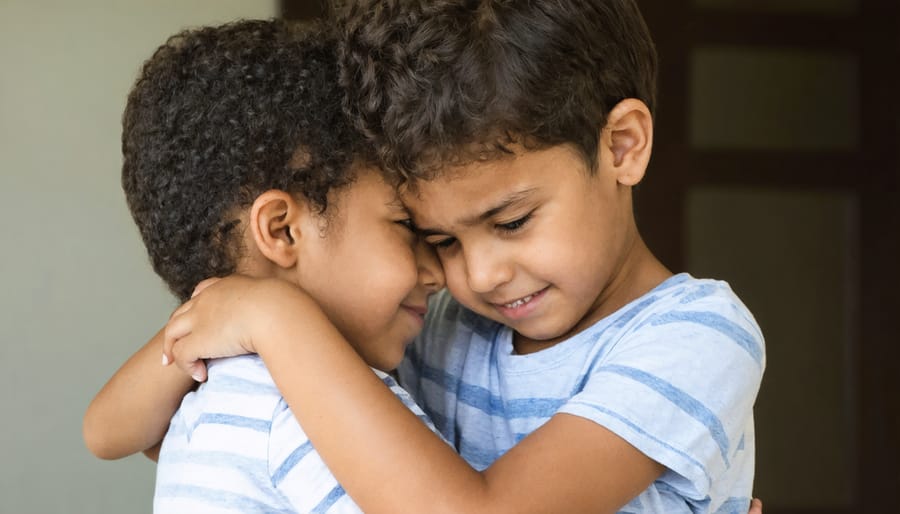
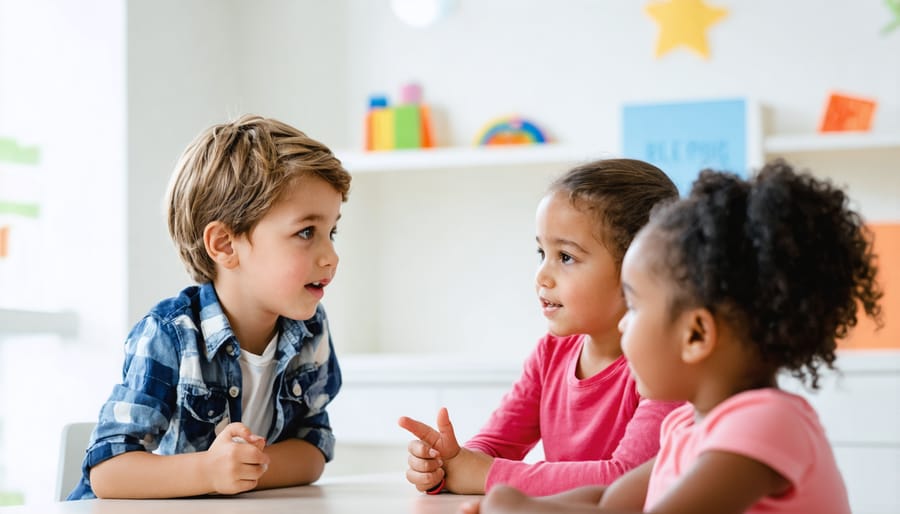
Communication and Listening Skills
Expressing Thoughts and Feelings
When it comes to expressing thoughts and feelings, it’s essential to teach children how to communicate effectively and respectfully. Encourage your child to use “I” statements when sharing their emotions, such as “I feel sad when you don’t share with me” instead of “You’re mean.” Help them identify and name their emotions by discussing feelings in everyday situations or while reading books together. Model active listening and validate their feelings to create a safe space for sharing. Teach them to express gratitude and appreciation for others, as this fosters positive relationships. Encourage them to ask questions and share their ideas during family discussions, and praise them for speaking up respectfully. By providing a supportive environment and teaching these strategies, you can help your child develop the confidence and skills needed to articulate their thoughts and feelings clearly and compassionately.
Active Listening and Responding
Teaching active listening skills is crucial for 7-year-olds to engage in meaningful conversations. Encourage your child to maintain eye contact, nod, and use facial expressions to show they are paying attention. Practice taking turns speaking and waiting for the other person to finish before responding. Teach them to ask relevant questions and make comments that show they understand what the other person is saying. Model active listening yourself by giving your child your full attention when they speak to you. Praise your child when they demonstrate good listening skills to reinforce the behavior. With consistent practice, your child will become a more attentive and responsive communicator.
Cooperation and Teamwork
Sharing and Taking Turns
Learning to share and take turns is a crucial social skill for 7-year-olds to master. Encourage your child to practice sharing toys, books, and other resources with siblings or friends. Explain that sharing doesn’t mean giving up their possessions permanently but rather allowing others to enjoy them for a short time. Model turn-taking behavior during family activities, such as board games or conversations, to demonstrate the importance of patience and consideration for others. Praise your child when they exhibit good sharing and turn-taking behaviors, reinforcing the positive impact of these actions on their relationships. If conflicts arise, guide them through problem-solving techniques, such as setting timers for turns or finding alternative activities that everyone can enjoy together. Remember that mastering these skills takes time and practice, so be patient and consistent in your approach to teaching sharing and turn-taking.
Working Together Towards a Common Goal
Encouraging children to work together on group projects is an essential part of developing their social skills. By participating in collaborative activities, 7-year-olds learn the importance of cooperation, communication, and compromise. Parents and teachers can foster these skills by assigning tasks that require teamwork, such as creating a story together or building a model. Emphasize the value of each child’s unique contributions and the power of peer support in achieving a common goal. Teach children to listen actively to their peers’ ideas, take turns, and share responsibilities. Encourage them to celebrate their collective successes and learn from any challenges they face along the way. By nurturing a sense of togetherness and shared purpose, adults can help 7-year-olds develop the collaboration skills they need to thrive in social settings.
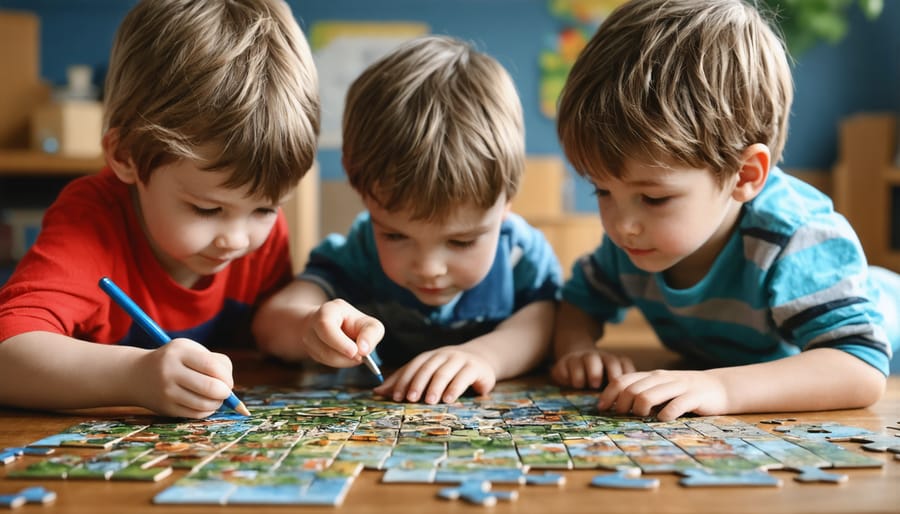
Conflict Resolution and Problem-Solving
Identifying and Addressing Conflicts
At 7 years old, children are still learning how to navigate social situations and may encounter conflicts with peers. Help your child identify conflicts by discussing common scenarios, such as disagreements over toys or rules in a game. Encourage them to express their feelings calmly and listen to others’ perspectives. Model effective problem-solving strategies, like taking turns, compromising, or seeking help from an adult when necessary. Role-play different conflict situations and guide your child through the resolution process, emphasizing the importance of finding peaceful solutions. Praise your child when they successfully resolve a conflict or remain calm in a challenging situation. By teaching these skills early on, you equip your child with the tools to build and maintain healthy relationships throughout their life.
Finding Win-Win Solutions
Teaching children to find win-win solutions is a valuable skill that fosters empathy, creativity, and cooperation. Encourage your child to brainstorm multiple solutions to a problem, considering the needs and feelings of all parties involved. Role-playing can be an effective tool for practicing these skills in a safe environment.
When conflicts arise, guide your child through the process of identifying the problem, expressing their own feelings and needs, and actively listening to the other person’s perspective. Help them generate ideas that benefit everyone, and praise their efforts to find fair compromises.
Emphasize the importance of flexibility and open-mindedness in problem-solving. Teach your child to approach challenges with a positive attitude and a willingness to collaborate. By modeling these skills yourself and providing opportunities for your child to practice them, you can help them develop a strong foundation for building healthy relationships and navigating conflicts throughout their lives.
Conclusion
In conclusion, developing social skills is a crucial aspect of a 7-year-old’s growth and development. By fostering empathy, effective communication, cooperation, and conflict resolution skills, parents and educators can help children build strong, healthy relationships with peers and adults alike. It’s essential to remember that social-emotional learning is an ongoing process that extends beyond the early years of childhood. As children grow and face new challenges, they will continue to refine and strengthen these skills.
Providing a supportive and nurturing environment, modeling positive social behaviors, and offering guidance when needed can make a significant difference in a child’s social-emotional development. By prioritizing these skills and incorporating them into daily life, we can help 7-year-olds develop the confidence and competence they need to navigate social situations successfully.
Remember, every child is unique and may develop social skills at their own pace. With patience, understanding, and consistent support, we can empower our children to become socially and emotionally intelligent individuals who thrive in their relationships and personal lives.

